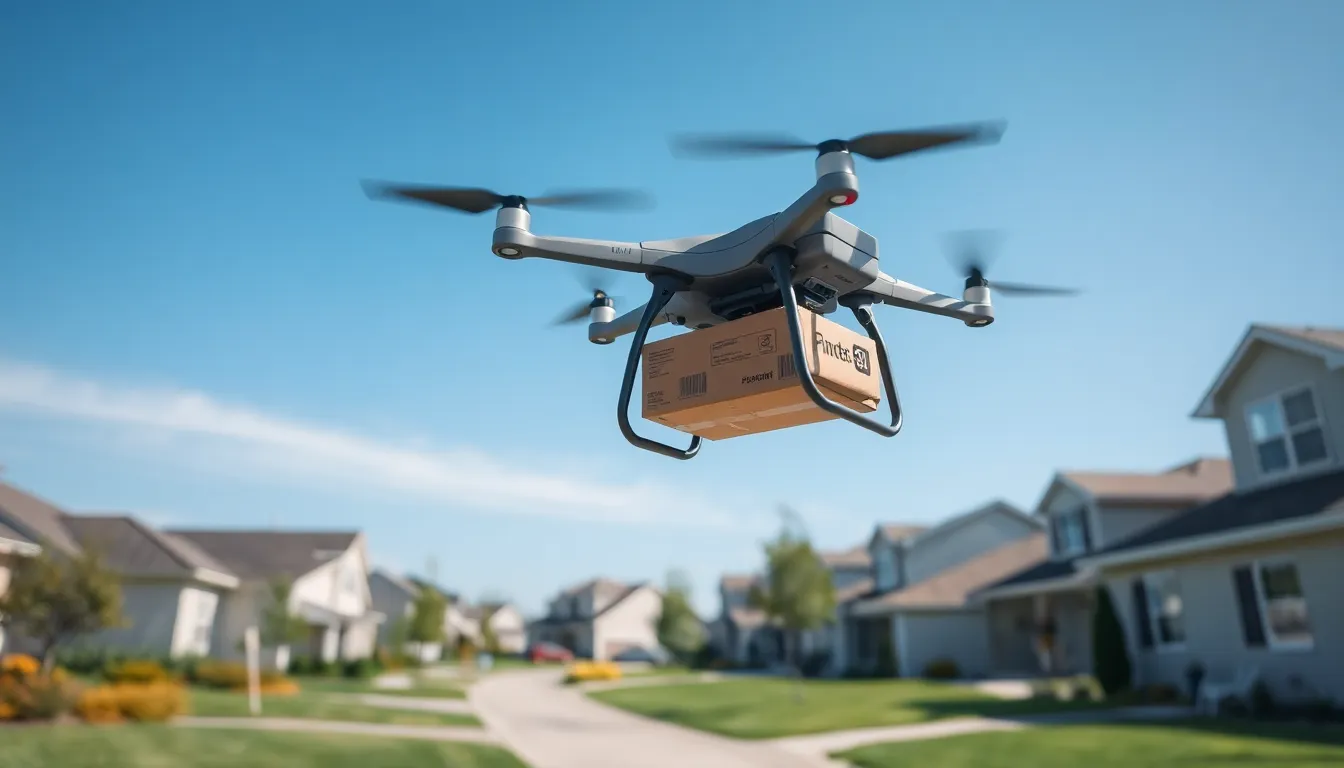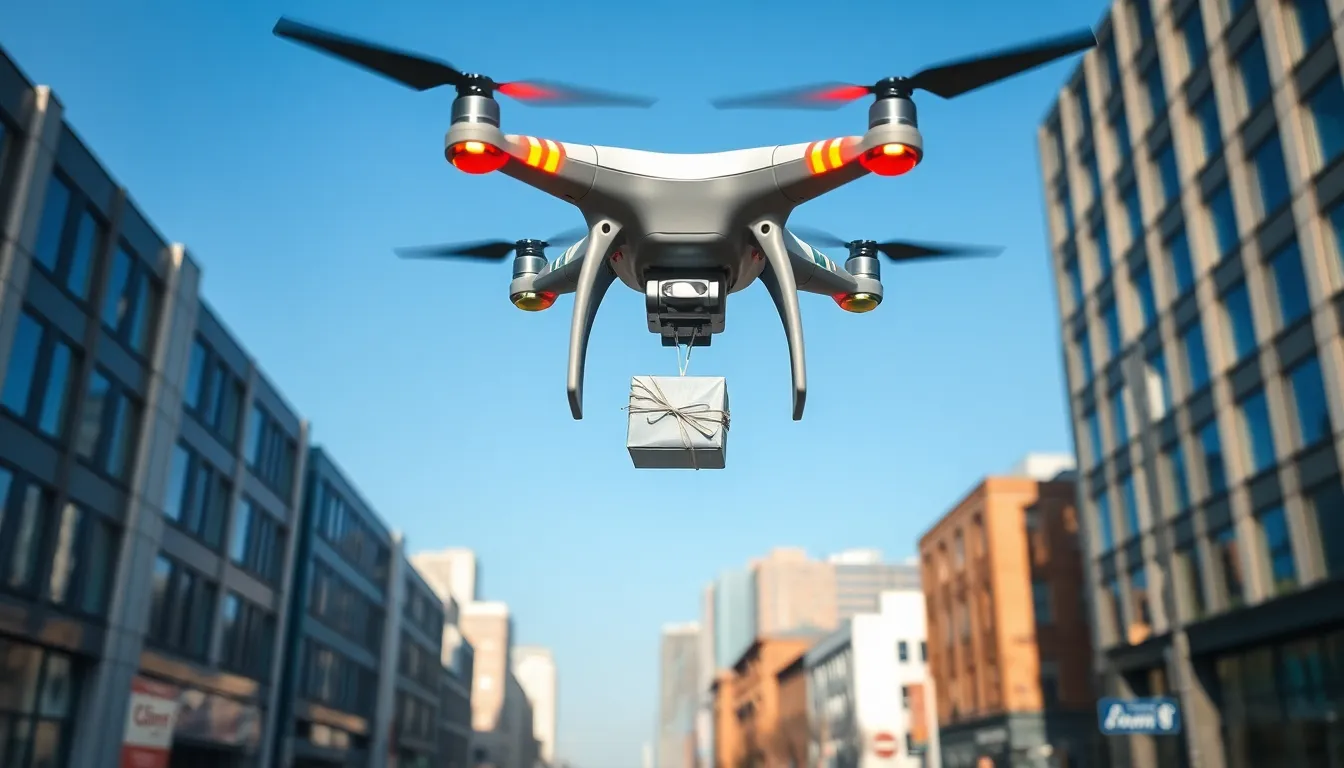In a world where instant gratification reigns supreme, drones are swooping in to save the day for e-commerce. Forget waiting days for that must-have gadget or trendy outfit—now, it’s all about speedy deliveries that’ll make you feel like a superhero. Imagine a tiny flying robot zooming through the sky, delivering your online shopping haul before you can even say “add to cart.”
Table of Contents
ToggleOverview of Drones for E-commerce
Drones transform e-commerce logistics by significantly decreasing delivery times. They’re capable of delivering packages within minutes of an order being placed, aligning with the consumer demand for immediacy. Retailers increasingly utilize drones to enhance customer satisfaction through faster fulfillment options.
Various industries benefit from drone delivery technology. In the food sector, restaurants deploy drones for quick meal deliveries, while e-commerce giants use them for transporting diverse products. Efficient delivery systems help businesses maintain a competitive edge.
Adopting drones can also reduce operational costs for companies. Traditional delivery methods often involve expenses related to vehicle maintenance and fuel. Drones, on the other hand, minimize these costs while maximizing delivery accuracy.
Regulations surrounding drone usage are evolving. While initial restrictions limited operational capabilities, recent developments facilitate broader applications in urban environments. Retailers explore partnerships with drone manufacturers to ensure compliance while expanding services.
Challenges exist despite the advantages drones offer. Weather conditions and technical malfunctions pose risks to timely deliveries. However, companies are investing in technology that enhances navigation and safety protocols.
Customer interest continues to grow as drone delivery options become more prevalent. Consumers increasingly expect efficient, innovative solutions when making purchases online. As businesses adapt to these preferences, drone technology will likely play a crucial role in shaping the e-commerce landscape.
Benefits of Drones in E-commerce

Drones provide significant advantages for e-commerce businesses, especially regarding delivery efficiency and cost management.
Faster Delivery Times
Drones reduce delivery times remarkably. Capable of operating independently, they can transport packages directly to customers within minutes. This speed meets consumer expectations for instant gratification, boosting customer satisfaction. Research indicates that drone deliveries can cut traditional delivery times by up to 80%. Adopting this technology helps businesses stand out in a competitive market. Retailers can offer same-day delivery options that enhance their appeal. Meeting immediate needs not only attracts new customers but also encourages repeat purchases.
Reduced Operational Costs
Operational costs decrease significantly with drone utilization. By minimizing reliance on delivery trucks, companies save on fuel and labor expenses. Drones require lower maintenance and operational overhead compared to traditional delivery vehicles. Estimates suggest that businesses can cut delivery costs by up to 50% when using drones. This reduction enables e-commerce platforms to allocate resources more efficiently. Additionally, drones allow for more direct routes, maximizing delivery efficiency. Embracing this technology supports long-term financial sustainability in the evolving e-commerce landscape.
Challenges of Implementing Drones
Implementing drones in e-commerce presents various challenges that companies must navigate. These obstacles impact overall efficiency and effectiveness in adopting drone delivery systems.
Regulatory Hurdles
Regulatory challenges pose significant issues for drone deployment. Agencies such as the Federal Aviation Administration (FAA) enforce strict guidelines on drone operations, including restrictions on flying in urban areas. Compliance with these regulations often complicates logistics planning and may delay implementation timelines. Moreover, evolving regulations necessitate ongoing monitoring and adaptation to ensure adherence. Companies must also secure necessary permits, which can prolong the approval process. Navigating this complex regulatory landscape requires careful planning and active engagement with authorities.
Technical Limitations
Technical limitations hinder effective drone operations in e-commerce. Drones face constraints regarding payload capacities, impacting the size and weight of packages that can be delivered. Additionally, battery life serves as a critical factor that restricts delivery distances and overall efficiency. Weather conditions can also create challenges, as high winds and rain may inhibit flight capabilities. Navigation systems must be robust to manage obstacles and ensure package safety during deliveries. Investment in advanced technology is essential for addressing these limitations and improving reliability within the drone delivery framework.
Case Studies of Successful Drone Delivery
Drones are proving their potential in e-commerce through various successful implementations across companies. Real-world examples illustrate how this technology enhances delivery efficiency and customer satisfaction.
Company A’s Implementation
Company A introduced drones to streamline last-mile deliveries. By deploying drones, it achieved delivery times significantly under 30 minutes for urban areas. Utilizing advanced routing algorithms, Company A optimized flight paths, minimizing delays. The pilot program showcased drones delivering essential items, like electronics and household products, directly to customers’ doorsteps. Customers reported high satisfaction scores, appreciating the convenience of quick access. This initiative not only reduced operational costs but also expanded Company A’s market reach, enticing consumers seeking fast delivery options.
Company B’s Results
Company B’s focus on drone delivery yielded impressive outcomes. Drone deliveries increased by 75% in cities where the service launched. Within weeks, it saw a 50% reduction in delivery-related expenses, primarily due to decreased fuel and labor costs. Customer feedback highlighted rapid service as a vital selling point, with many opting for drone delivery over traditional methods. This strategic move contributed to Company B’s growth, capturing a larger market segment. Enhanced logistics capabilities positioned Company B as a leader, demonstrating the potential for continued expansion in the e-commerce landscape.
Future of Drones in E-commerce
Drones play a pivotal role in the future of e-commerce, transforming delivery logistics. Rapid advancements in technology allow for deliveries in under 30 minutes, significantly benefiting companies and consumers alike. Increased customer demand for immediacy drives e-commerce retailers to implement drone technology.
Operational cost reductions alter traditional delivery models. Up to a 50% decrease in delivery expenses becomes possible, allowing retailers to focus on enhancing customer experiences. Efficient resource allocation supports the sustainability of e-commerce platforms in a highly competitive market.
Regulatory frameworks evolve to accommodate the growing use of drones. Retailers partner with manufacturers to navigate compliance challenges while expanding service options. Ongoing adjustments in regulations from the FAA shape logistics strategies, influencing the implementation timeline for drone delivery services.
Weather conditions present obstacles, yet companies invest in advanced technology. Improved navigation systems and safety features enhance reliability during operations. Despite these challenges, customer interest in drone deliveries remains strong, with many consumers expecting faster, innovative shopping solutions.
Successful real-world examples exemplify the potential for drone implementation. Case studies show significant improvements in delivery metrics. Company A achieved a 75% increase in deliveries through drone use, setting a benchmark for others. Company B noted customer satisfaction skyrocketing due to deliveries completed in less than 30 minutes.
As infrastructure develops, drones will undoubtedly transform e-commerce. Continuous investment in technology and strategic partnerships will remain essential for maximizing the benefits of drone logistics. Shifts in consumer behavior toward instant delivery options will further cement drones as a crucial element in the future of online shopping.
Drones are set to redefine the e-commerce landscape by providing faster delivery solutions that meet consumer expectations. Their ability to significantly reduce delivery times and operational costs positions them as a game changer for retailers aiming to enhance customer satisfaction. As technology advances and regulations adapt, the integration of drones into logistics will only become more streamlined.
Retailers that embrace this innovation will likely see increased customer loyalty and a competitive edge in the market. The future of online shopping hinges on the successful implementation of drone technology, making it an essential focus for businesses looking to thrive in an ever-evolving e-commerce environment.



